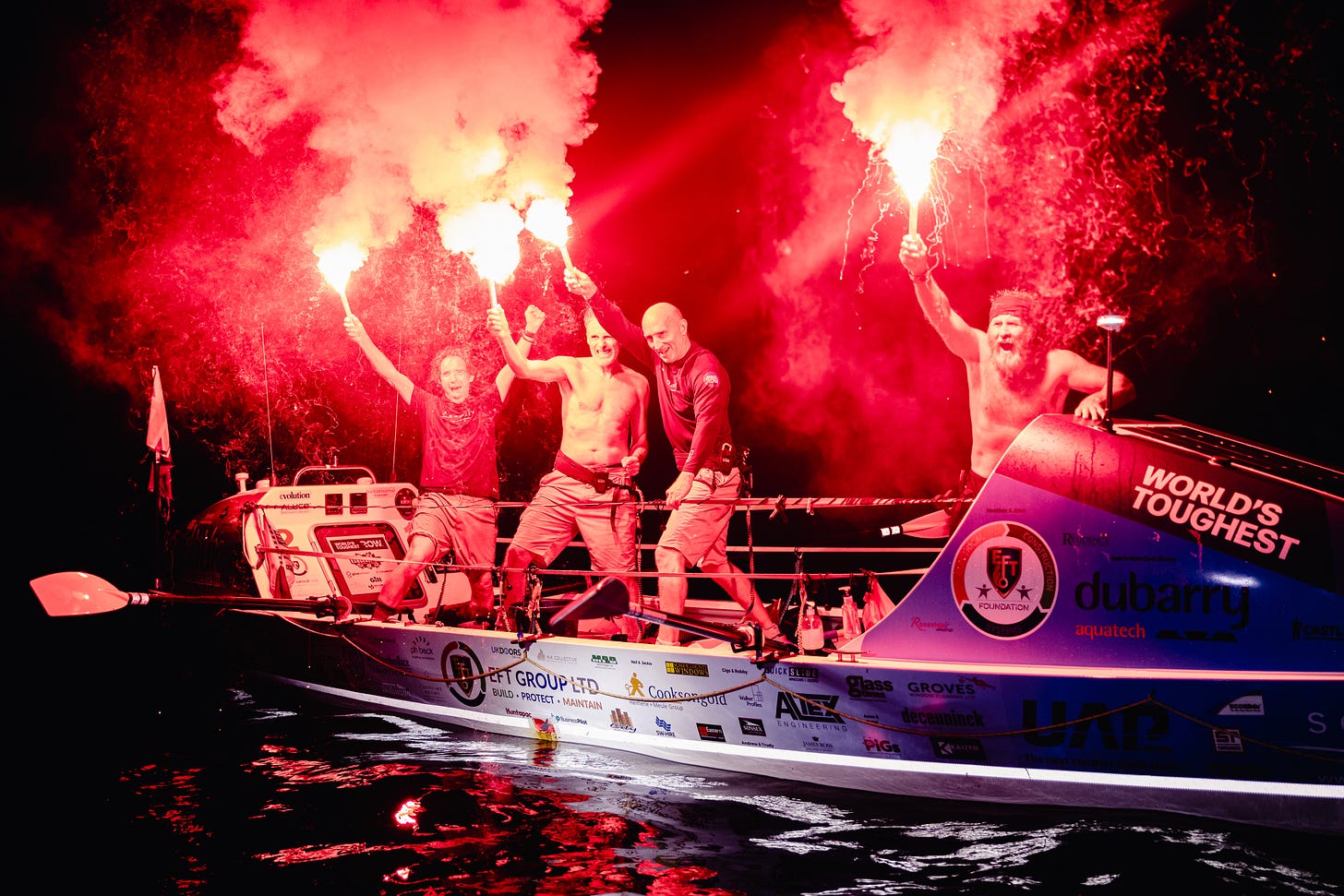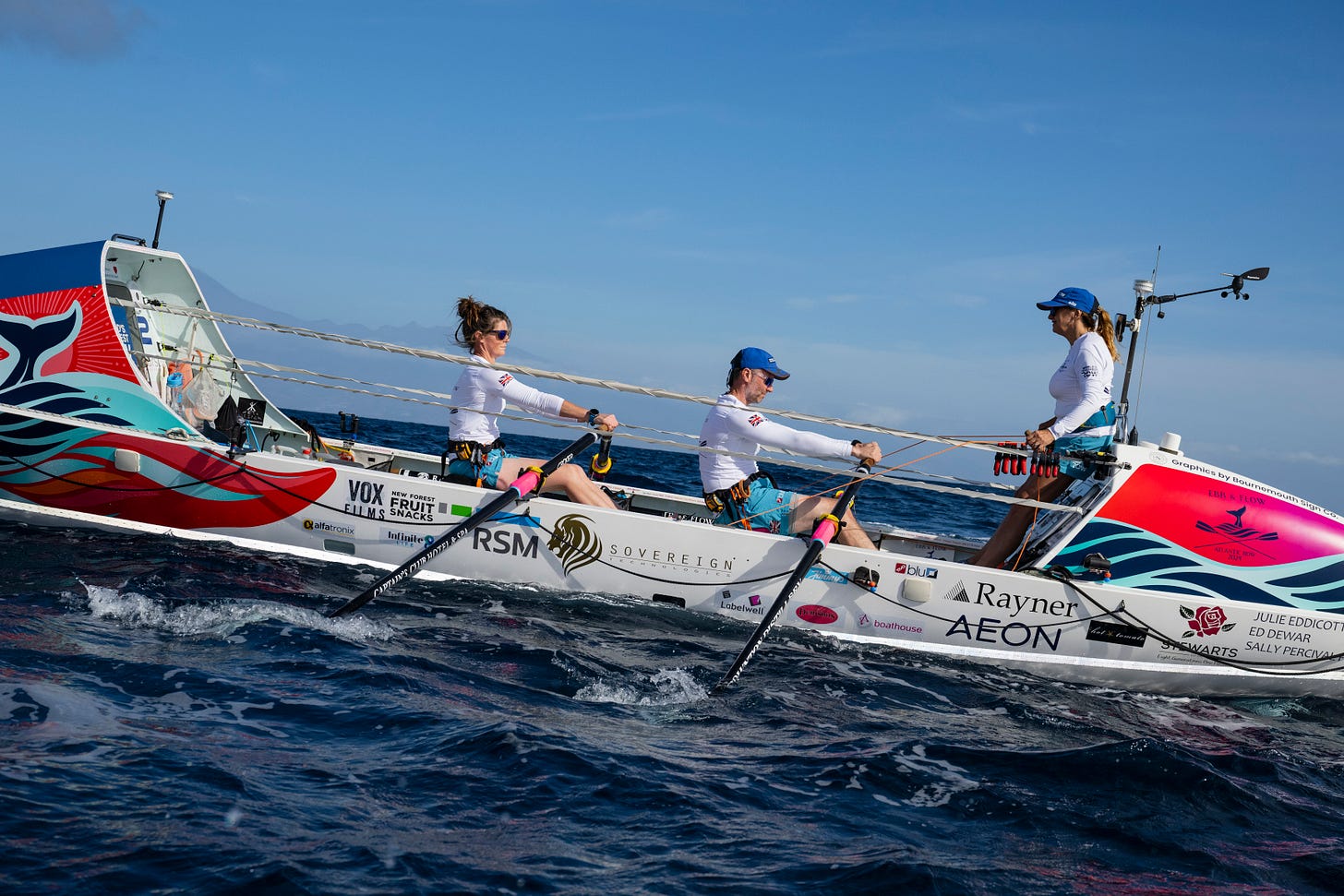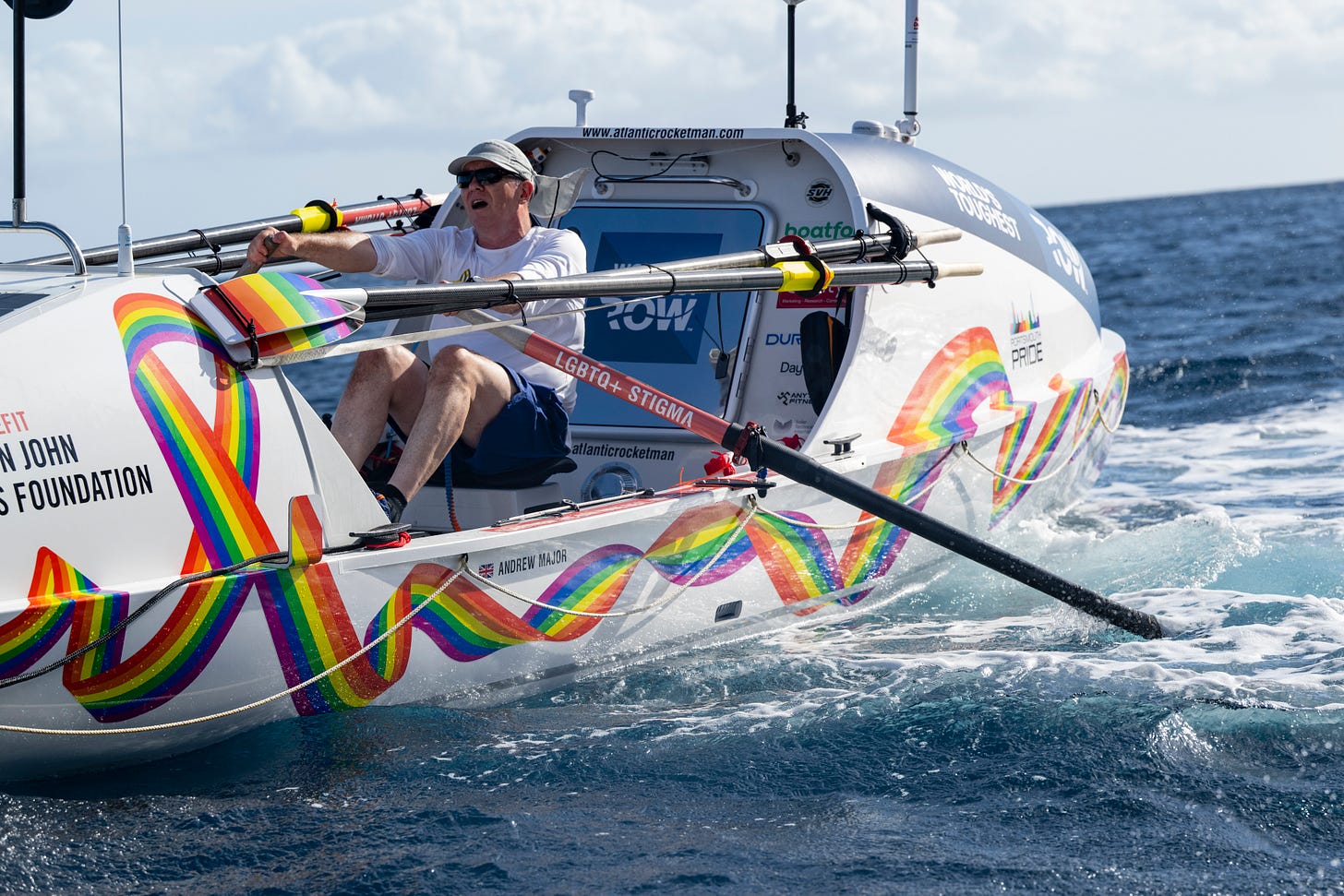Learning how to go with the flow
Why is there a picture of a balloon illustrating this week's newsletter? Read on and find out!
The update is a little bit late this week as I am away for a break before leaving freelance life to join the Telegraph (don’t worry, the newsletter will continue!). I went to Chateau D’Oex in Switzerland for a hot air balloon festival and – despite being scared of flying – went on one of the flights.
It was glorious, calm and slightly surreal up there, floating among the mountains and over treetops. There were parallels with rowing the Atlantic, I thought. One being the central message that you have to “go with the flow”.
I was nervous when we almost brushed some trees, and when the pilot had to choose to land between some power lines. It made me think about fear, which is perhaps a subject that we don’t discuss enough when it comes to ocean rowing. How can someone who’s scared of flying and being in the air row an ocean?
What are we scared of?
Partly, fear is irrational - I’m just not scared of being on the water. Many people are, which is one reason why so few have rowed the Atlantic. As many of you know, most people’s reaction when they hear you or a relation are doing it is simply a straight, “No. I would not do that.” But they fly in aeroplanes quite happily several times a year. Something I dread.
Partly, fear is lack of understanding. My fear of the landing came from ignorance about how the balloon worked. Once I’d gone on the incredible flight simulator in the town’s museum, Espace Ballon, I understood more about opening the top of the balloon to make it lower, heating it up to make it rise and how the pilot works with the wind and atmosphere.
Finally, fear also arises from being out of control. And that’s where acceptance comes in. Hot air balloon pilots and passengers have to accept they can’t predict where they are going to land. Ocean rowers all know we are going to Antigua (hopefully!), but there is no controlling the Atlantic Ocean on the way there.
Training the fear away
What Atlantic Campaigns and coaches like Duncan Roy do so brilliantly is to train us up so that we are fully prepared for everything the sea has to throw at us. It is the best way to confront fear: to understand fully what the boat does and be drilled to use that knowledge when you have to.
That doesn’t mean rowers won’t, or shouldn’t, feel afraid before they leave La Gomera. I remember confiding in a member of the Bubbleheads that I was nervous at the leaving party. “The worst you’ll get is sore hands and a sore arse,” he said.
On arrival in Antigua, he laughed wryly when recalling that conversation. Perhaps they’d underestimated the power of the sea. Like us, they had come very close to pitch-poling one night, the terrifying night where I made everyone wear their lifejackets. (We pretty soon got bored of taking them on and off, however.)
As I’ve mentioned before, I was the catastrophising crew pessimist – and I firmly believe you need one, because they will make you practise your drills.
When the worst happens
So that’s a very long way of coming round to the story that really stood out for me this week: Sea Soar’s interview with The Times. In it, crew member Niall Brannigan revealed when the boat capsized, it did not initially self-right: “One of the crew opened the hatch door a tiny bit, which was an absolute crime in our book, and all of a sudden this huge rogue wave hit and ripped open the door and filled up the cabin, which I was inside of. I pulled the door shut but for four or five seconds I thought that was it for me.”
But, as they had been trained to do, the three remaining crew members on the upturned hull managed to get their weight on one side, and coax the boat over. The capsize knocked out most of their electrics – which is why the team only sent audio updates back from then on. The experience, quite naturally, made two crew want to stop. But as you can’t really stop on the Atlantic, they carried on – and what an exceptional achievement to finish in 52 days, 20 hours and 43 minutes.
Another crew who are still grinding out the miles are Ebb and Flow. They are so close now, with just over 133NM to go until Antigua, but boy does it sound incredibly tough out there. Ed Dewar is injured so they are a man down, they’ve used all their painkillers up, almost run out of food, and are hand steering for about 50 per cent of the time. They couldn’t have picked a better name for their boat, or for the subject of this newsletter!
But the best news is: they are almost at their £90,000 target at time of writing – wouldn’t it be great if the ocean rowing community get them to their total by the time they arrive?
Still out there on the ocean behind them are Glimmering Sea, Atlantic Rocketman and Yallah Go. In the latter crew, the mother and son combo of Suzanna Krekelberg and Bas de Vries have their own struggles. Beam on to the waves, they took the wise decision one night to take refuge in the stern cabin, waking up to find they’d done a full 360 degree capsize – but not lost anything as it was all secure. Another lesson in how preparation can prevent disaster.
Both they and Glimmering Sea are taking comfort in the birds that surround them, and anyone who’s rowed the Atlantic will know this is one of the miracles of the sea. Meanwhile, Atlantic Rocketman has recorded his own Desert Island Discs – what a brilliant idea! Listen to it if you can!
And finally, special mention this week must be made to the Cruising Free crew, who’ve just started their Atlantic Dash journey across the ocean. Sophie Pierce is facing a different kind of fear to other ocean rowers, because she has Cystic Fibrosis. Unlike anyone else, as she explained to me before they left, her lungs harbour bugs which can turn into a chest infection if she’s under stress.
But again, the crew have done everything they can to predict and prevent events on board, from installing a fridge, putting up more solar panels to power it, and in Sophie’s case, taking a course of preventative antibiotics before departure. So as one race draws to a close, another starts – and next week I’ll take a closer look at what they’ve been up to!
And in the meantime remember: feel the fear, and do it anyway!
READ MORE: Mark Slats on revolutionising ocean rowing
READ MORE: The secret tech Lessons from a Boat used








